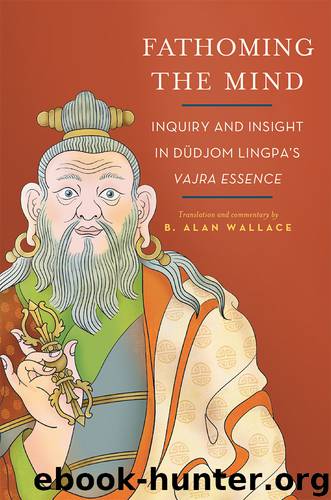Fathoming the Mind by B. Alan Wallace

Author:B. Alan Wallace
Language: eng
Format: epub
Publisher: Wisdom Publications
How All Phenomena Arise and Appear
Faculty of Luminosity asked, “O Teacher, Bhagavān, if they are not established as being real but are unreal in that way, from what do all phenomena arise and appear? May the Teacher explain!”
Thus far, the emphasis has been on the empty aspect of phenomena. Now the question is, how do they actually arise?
He replied, “O Faculty of Luminosity, grasping to an identity acts as the primary cause and conceptualization acts as the contributing condition, due to which phenomena emerge as mere appearances. When the initial moment of consciousness moves to an object, the appearance arises suddenly. With the conceptual thought that something is being eliminated and then the appearance of the idea that something has been destroyed, it shifts or vanishes altogether. All phenomena are mere appearances arising from dependently related events, and nothing more. There is certainly nothing whatsoever that is truly existent from its own side.”
When waking consciousness emerges in progression from the substrate, first is the substrate consciousness, followed by afflictive mentation, mentation, and various appearances. Without the sense of self introduced by afflictive mentation, also called the “I-maker” (Skt. ahaṃkāra), no appearance can arise. This causal grasping at identity occurs at a primeval level. The conceptualization that follows is secondary. Through the combination of these two, the primary cause181 and the contributing condition,182 all appearances manifest.
Take the example of a seed as the primary cause, with the contributing conditions of soil, moisture, and sunlight; when cause and conditions combine, a sprout appears. If either primary cause or secondary conditions are absent, no sprout appears. According to the general Buddhist theory of causality, nothing is ever produced by a single cause alone. There are always contributing conditions.
Gen Lamrimpa, an extraordinary yogin with whom I lived for a year, said that when you meditate on emptiness, as he had at great length, and you gain some realization, then you may reach a point where all conceptualization collapses. This is not like practicing śamatha, with awareness completely withdrawn from all appearances, or else as in falling asleep. In this case your senses and awareness may be wide open; and yet when concepts collapse and conceptual imputations cease, all appearances vanish. Without the contributing condition of conceptualization, appearances cannot arise. From the perspective of one who is meditatively absorbed in the nonconceptual realization of emptiness, the phenomenal world of saṃsāra does not exist at all. As the Heart Sūtra declares: “there are no visual forms, sounds, odors, tastes, tactile sensations, or phenomena.”
This contradicts our intuition. We imagine that an object really exists from its own side, and that concepts and names have no bearing on its appearance or disappearance. In fact, it’s just the opposite. The phenomena arise, remain, and disappear relative to the perceptions and conceptual designations of them.
The view presented here could not be further removed from the dominant materialistic view that consciousness and mind are simply properties of the brain. The mainstream assumption is that consciousness, thought, and mind emerge when assemblies of neurons in the brain interact dynamically.
Download
This site does not store any files on its server. We only index and link to content provided by other sites. Please contact the content providers to delete copyright contents if any and email us, we'll remove relevant links or contents immediately.
The Way of Zen by Alan W. Watts(6587)
Ego Is the Enemy by Ryan Holiday(5400)
The Art of Happiness by The Dalai Lama(4118)
The Book of Joy by Dalai Lama(3965)
Why Buddhism is True by Robert Wright(3439)
Spark Joy by Marie Kondo(3292)
Shift into Freedom by Loch Kelly(3189)
Happiness by Matthieu Ricard(3036)
A Monk's Guide to a Clean House and Mind by Shoukei Matsumoto(2901)
The Lost Art of Good Conversation by Sakyong Mipham(2638)
The Meaning of the Library by unknow(2557)
The Unfettered Mind: Writings from a Zen Master to a Master Swordsman by Takuan Soho(2290)
The Third Eye by T. Lobsang Rampa(2255)
Anthology by T J(2201)
Red Shambhala by Andrei Znamenski(2180)
The Diamond Cutter by Geshe Michael Roach(2056)
Thoughts Without A Thinker: Psychotherapy from a Buddhist Perspective by Epstein Mark(2007)
Twilight of Idols and Anti-Christ by Friedrich Nietzsche(1886)
Advice Not Given by Mark Epstein(1873)
